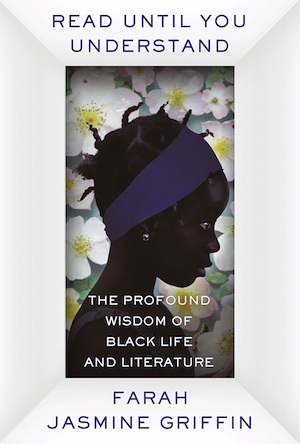Winner of the 2022 Phi Beta Kappa Christian Gauss Award
By Allen D. Boyer
Read Until You Understand, by Farah Jasmine Griffin, is a deceptively simple book, a brilliant and subtle balance of structure and texture. Half of it is a memoir of growing up in a row-house neighborhood of South Philadelphia. Loosely anchored to these memories are meditations on the Black American writers whom Griffin has studied, taught, and sometimes worked beside, a roster that runs from Phillis Wheatley to Toni Morrison and Toni Cade Bambara.
“As a girl, I spent hours in bookstores with my father; hours more in fabric stores with my mother,” Griffin remembers. Emerson Maxwell Griffin was a welder at Sun Ship Company, a thinker and talker, always with a paperback in his back pocket — agnostic in religion, but shaped by having been a sometime Black Muslim (“my father left the Nation before Malcolm did”).
A Navy veteran, Em Griffin used his GI Bill benefits to buy his bride a house and to study architecture at Temple University. Griffin learned that for years, until he finally quit, her father had been “a high-functioning drug addict, working every day and making various efforts to rid himself of his habit.” He died when Griffin was nine, of a late-night cerebral hemorrhage, but not before he had presented the little daughter with a copy of Bryan Fulks’s Black Struggle: A History of the Negro in America, urging her, “read it until you understand.”
Mena Griffin (short for Wilhelmena) was a self-taught seamstress. In Philadelphia’s garment district, she made swimsuits for the U.S. Olympic Swimming team; at home, late at night, she stitched dresses on her sewing machine while listening to Earth Wind & Fire. She reared a family of daughters and spent part of her husband’s life insurance money to repair her house, replace the fence, and provide for a garden.
It is thanks to her father, Griffin believes — a man who brought her along to marches and rallies — that she knows that the last paragraph of the Black Panther Party’s Ten Point Plan reprints the first paragraph of the Declaration of Independence. Other discoveries Griffin made on her own, like the career of Philadelphia abolitionist Frances Ellen Watkins Harper and how it prefigured the lives of contemporary activists.
Griffin effortlessly connects Barack Obama’s refashioning of Abraham Lincoln’s rhetoric with Frederick Douglass’s arguments in “What to the Slave Is the Fourth of July?” She thinks Toni Morrison may have erred when she likened Ta-Nehisi Coates to James Baldwin; Between the World and Me is closer to the pessimism of Richard Wright. Being reared by parents “who believe neither in the American dream nor in God,” she suggests, “also left [Coates] skeptical of that thing that Baldwin never lost, hope.” In Men We Reaped: A Memoir, by Jesmyn Ward, with its grim tally of deaths among the author’s family and friends (“being Black, male, Southern, and poor is a common condition that contributes to their demise”), Griffin recognizes a plague whose shadow also fell on her family.
Ironically, the strongest connection that Griffin draws between the neighborhood where she grew up and the literature she has read and taught comes in a chapter she describes as “a departure, a detour, from the world of books to the language of sound.” She speaks of music — on the radio, on the jukebox in a luncheonette her family owned, a sound created by fugitive slaves and Great Migration job-seekers and the founders of the Mother Bethel AME Church. “They became a Black working class, and they created their own extraordinary music culture — jazz, gospel, and R & B,” Griffin remembers.
“I came of age in this Philadelphia, when Frank Rizzo, despised by large numbers of Black Philadelphians, was mayor, when the Black Panthers held conventions and served free breakfasts. . . .”
“Everyone debated the shift in Miles’s music with the album Bitches Brew, and analyzed the cover of his On the Corner, or discussed the conspiracy theories about the model on Ohio Players album covers. Daddy was the jazz head, a bebopper, former hoofer, the intellectual who’d given up dance during his brief stint with the Nation of Islam. He stopped dancing but never gave up jazz. My mother liked whatever he liked. . . . My big sister Myra and my cousins Irvin and Leon listened to Motown, which everyone loved . . . .”
In its final pages, as it focuses on Griffin’s mother, with her family and garden, a sense of grace settles over the book. That may be a gift from the author’s mother. As Griffin sums up, these chapters illustrate “how a people have lived with style, grace, brilliance, and beauty in the face of persistent crises and catastrophe.” This is a book about achievement and a book about family and at both it succeeds.
Allen D. Boyer (ΦBK, Vanderbilt University) is a writer and reviewer living on Staten Island. Vanderbilt University is home to the Alpha of Tennessee Chapter of Phi Beta Kappa.




